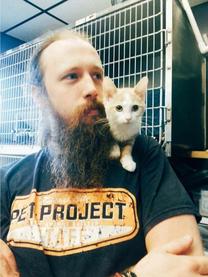
Stephen Holdeman is the head of the Feline Behavior and Training Department at KC Pet Project, the high intake municipal open-admissions No-Kill shelter facility for Kansas City, Missouri. Stephen is focused on addressing many issues for cats he encounters in the shelter industry, and has seen much success implementing his concepts at KCPP. He has worked in multiple shelters in the Kansas City area since 2008, and currently maintains numerous special programs for cats of all types. He also provides a behavior consultation service stationed out of KC Pet Project for owners experiencing issue with their cats that may be considering surrendering them to a shelter. This consultation service is the only free service available to local owners, and has seen a 92% success rate at addressing behavior issues in 2017. Stephen is the author of “Feline Enrichment: Best Practices for Municipal Shelters.”
Stephen has always been focused on the “ground level” of Animal Welfare. He has gathered most of his life’s attention into creating a more conscious, honest approach to servicing cats in the shelter environment. Since his beginning in Animal Welfare, Stephen has sought to identify and support various types of shelters cats who he has felt have been “left behind” by the even the most well-meaning shelter system. He has typically held a difference in opinion on what is obtainable for cats in the shelter environment, and has had great success in implementing programs that had previously been given criticism over their goals or logistics.
Since his time at KC Pet Project, Stephen has been able to create several special initiatives for his population, including the only adoption program in the area for Feline Leukemia positive cats, as well as the area’s first program aimed at diagnosing and repairing damage from declaw operations on shelter cats. He hopes his work in creating a program attentive to the issues of declawed cats will cause similar programs to spring up around the country. His most recent growing program is called “Pioneer Cats,” aimed at re-examining how shelters interact with their “feral” populations of cats, including the viability of adoption and behavior modification, as well as the effectiveness of Barn Cat and community programs.

